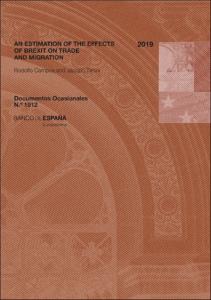An estimation of the effects of Brexit on trade and migration
Autor
Fecha de publicación
24-may-2019
Descripción física
19 p.
Resumen
Este documento utiliza un modelo de gravedad para estimar los efectos del brexit en dos dimensiones: el comercio de bienes y la migración. Simulamos dos escenarios: 1) no acuerdo, con reversión a las reglas de la OMC y sin trato especial para los migrantes
2) firma de un acuerdo bilateral de libre comercio (TLC). Según nuestros resultados, el brexit puede tener efectos negativos importantes sobre el comercio y los flujos migratorios entre la UE y el Reino Unido. En el escenario de la OMC, se prevé que los flujos comerciales disminuyan en un 30 % y la migración en cerca de un 25 %. Si el Reino Unido y la UE firman un acuerdo similar a un TLC (que no incluye la libre movilidad de la mano de obra), los efectos negativos sobre el comercio se reducen, aunque no hay una diferencia significativa en términos de migraciones con respecto al escenario de la OMC
This paper uses a gravity model approach to estimate the effects of Brexit in two dimensions: trade in goods and migration. We simulate two scenarios: 1) no agreement with reversion to WTO rules and no special treatment for migrants
2) signature of a bilateral free trade agreement (FTA). According to our results, Brexit may have large negative effects on trade and migration flows between the EU and the UK. In the WTO scenario, trade flows are predicted to drop by 30% and migration by close to 25%. If the UK and the EU sign an FTA-like agreement (which does not include free mobility of labour), the negative effects on trade are lessened although there is no significant difference in terms of migration with respect to the WTO scenario
2) firma de un acuerdo bilateral de libre comercio (TLC). Según nuestros resultados, el brexit puede tener efectos negativos importantes sobre el comercio y los flujos migratorios entre la UE y el Reino Unido. En el escenario de la OMC, se prevé que los flujos comerciales disminuyan en un 30 % y la migración en cerca de un 25 %. Si el Reino Unido y la UE firman un acuerdo similar a un TLC (que no incluye la libre movilidad de la mano de obra), los efectos negativos sobre el comercio se reducen, aunque no hay una diferencia significativa en términos de migraciones con respecto al escenario de la OMC
This paper uses a gravity model approach to estimate the effects of Brexit in two dimensions: trade in goods and migration. We simulate two scenarios: 1) no agreement with reversion to WTO rules and no special treatment for migrants
2) signature of a bilateral free trade agreement (FTA). According to our results, Brexit may have large negative effects on trade and migration flows between the EU and the UK. In the WTO scenario, trade flows are predicted to drop by 30% and migration by close to 25%. If the UK and the EU sign an FTA-like agreement (which does not include free mobility of labour), the negative effects on trade are lessened although there is no significant difference in terms of migration with respect to the WTO scenario
Publicado en
Documentos Ocasionales / Banco de España, 1912
Materias
Comercio internacional; Migración; Brexit; Modelos de gravedad; International trade; Migration; Gravity models; Comercio internacional; Fluctuaciones y ciclos económicos; Distribución de las rentas y riquezas de las personas; Reino Unido
Aparece en las colecciones:












